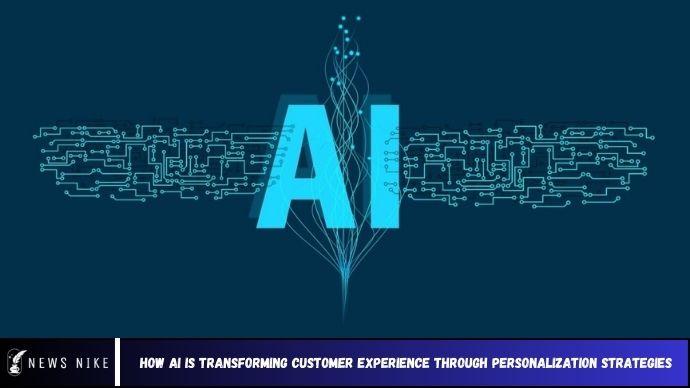AI to transform customer experience through personalization strategies. AI is enabling companies to analyze vast amounts of customer data, predict preferences, and deliver tailored solutions in real-time. This transformation not only enhances customer satisfaction but also boosts engagement, loyalty, and ultimately, business success. In this article, we’ll dive into how AI is reshaping customer experiences by offering advanced personalization strategies and why it’s a game-changer for modern businesses.
What is AI-Powered Personalization?
AI-powered personalization refers to the use of artificial intelligence to analyze customer data, behavior, and preferences to create personalized experiences. By leveraging machine learning algorithms, businesses can predict what a customer is likely to need or want, allowing them to offer relevant products, content, or services at the right time.
Key Elements of AI-Powered Personalization:
- Customer Data Analysis: AI collects and processes vast amounts of customer data, including browsing history, purchase patterns, and feedback.
- Machine Learning Algorithms: AI uses these algorithms to predict future behaviors, preferences, and needs.
- Tailored Recommendations: Based on the data, AI delivers personalized recommendations, product suggestions, and content to enhance the customer experience.
How AI is Transforming Customer Experience
1. Personalized Recommendations and Content Delivery
AI enables brands to provide highly personalized recommendations based on individual customer behavior. Online retailers, for example, analyze past purchases and browsing habits to suggest products customers are likely to buy. Streaming services, like Netflix, use AI to recommend shows and movies based on viewing history.
- Example: Amazon’s recommendation engine drives a large portion of its sales by suggesting products that align with each customer’s past behavior and preferences.
2. Enhanced Customer Support with AI Chatbots
AI-powered chatbots are changing how businesses interact with customers. These bots can provide real-time, personalized assistance by answering questions, solving problems, and guiding customers through their journey. They can even recognize returning customers and recall past interactions for more relevant conversations.
- Example: Chatbots powered by AI in the banking sector help users manage their accounts, check balances, and even make recommendations for financial products.
3. Predictive Analytics for Better Customer Service
By analyzing customer data, AI can predict potential issues before they arise. For example, if a customer is about to encounter an issue with a product, AI can automatically send an alert or solution, improving the customer’s experience and preventing dissatisfaction.
- Example: Airlines use AI to predict flight delays and proactively notify passengers, offering alternative options or compensation before customers even realize there is an issue.
4. Dynamic Pricing Models
AI can analyze real-time data, including demand, competitor prices, and customer behavior, to adjust pricing dynamically. This allows businesses to offer personalized pricing, discounts, or promotions to individual customers, enhancing their shopping experience and improving conversion rates.
- Example: Airlines and hotels often use AI-driven dynamic pricing to adjust ticket and room rates based on factors like booking time, customer preferences, and availability.
Benefits of AI in Personalization
- Increased Customer Engagement: AI helps brands deliver more relevant and timely interactions, boosting customer engagement and loyalty.
- Improved Customer Satisfaction: By anticipating customer needs and providing personalized solutions, businesses can increase satisfaction and reduce frustration.
- Higher Conversion Rates: Personalized offers, discounts, and product suggestions increase the likelihood of purchases, driving higher conversion rates.
- Cost Efficiency: AI automates many customer-facing processes, reducing the need for manual interventions and lowering operational costs.
The Future of AI in Customer Experience
AI-powered personalization will continue to evolve, offering even more advanced solutions. As AI technology becomes more sophisticated, businesses will be able to create hyper-personalized experiences, integrating voice, visual, and augmented reality interfaces. The future of AI in customer experience looks bright, with continuous improvements in automation, prediction accuracy, and emotional intelligence.
Conclusion
AI is reshaping the landscape of customer experience by enabling brands to deliver personalized interactions that resonate with individual customers. By using AI to analyze customer data, predict behavior, and offer tailored solutions, businesses can create meaningful connections that drive loyalty and long-term success. As AI technology continues to evolve, the potential for enhancing customer experience through personalization is limitless.
Frequently Asked Questions (FAQs)
1. How does AI enhance customer experience?
AI enhances customer experience by providing personalized recommendations, predictive analytics, and real-time customer support through automated tools like chatbots.
2. What are the benefits of AI-powered personalization?
Benefits include increased customer engagement, improved satisfaction, higher conversion rates, and cost efficiencies for businesses.
3. How do AI chatbots improve customer service?
AI chatbots provide instant, personalized responses to customer queries, offering solutions based on past interactions and preferences.
4. How is AI used in pricing models?
AI uses real-time data to adjust prices dynamically based on customer demand, competition, and buying behavior, offering personalized deals to customers.
5. Can AI predict customer behavior?
Yes, AI uses machine learning algorithms to analyze past behavior and predict future actions, helping businesses anticipate customer needs.
6. What industries benefit most from AI in personalization?
Industries like retail, healthcare, finance, and entertainment benefit the most, with AI helping improve recommendations, customer service, and overall experiences.

